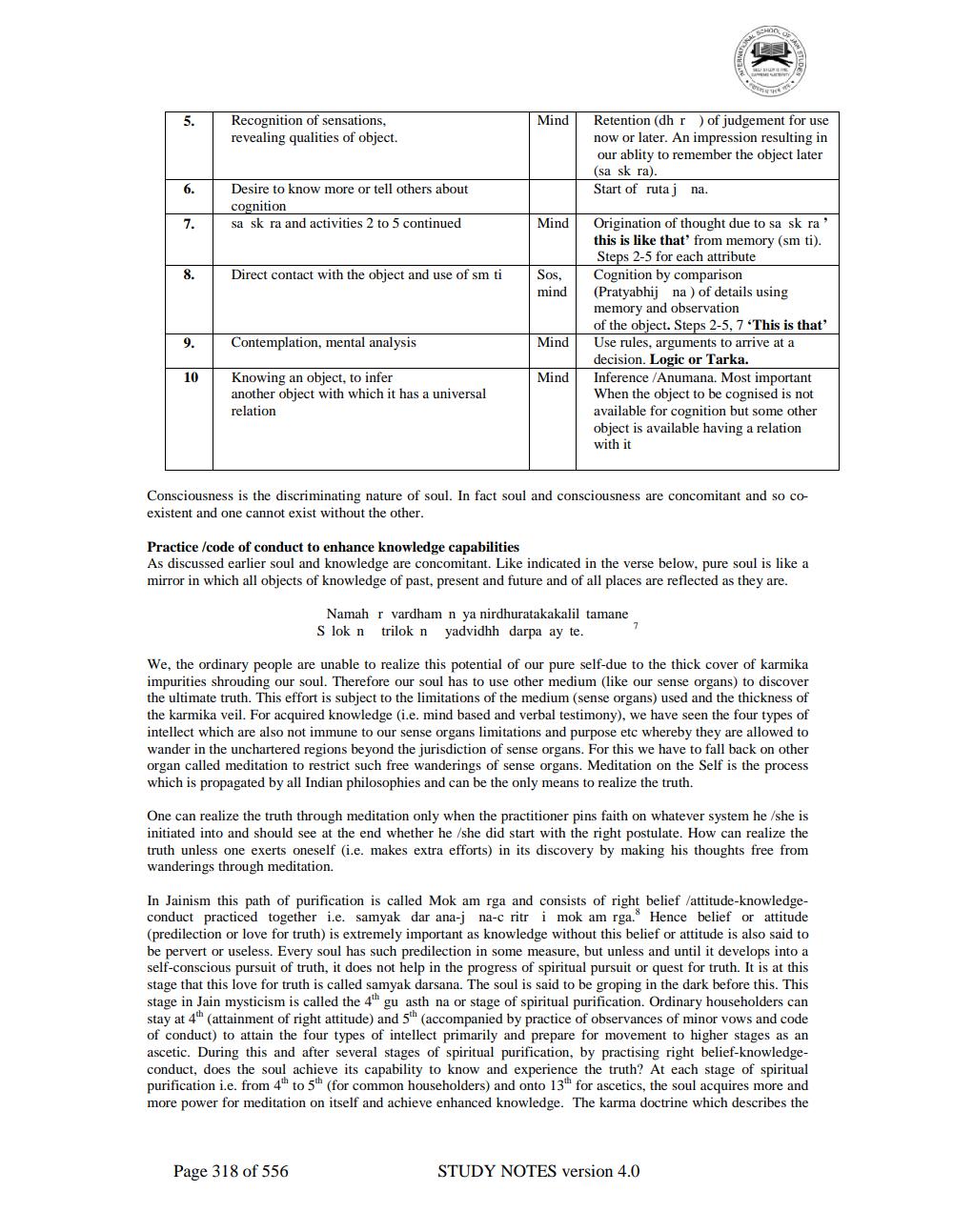________________
Mind
Recognition of sensations, revealing qualities of object.
Retention (dh r ) of judgement for use now or later. An impression resulting in our ablity to remember the object later (sa sk ra). Start of rutaj na.
Desire to know more or tell others about cognition sa sk ra and activities 2 to 5 continued
7.
Mind
Direct contact with the object and use of sm ti
Sos, mind
Contemplation, mental analysis
Origination of thought due to sa sk ra this is like that' from memory (sm ti). Steps 2-5 for each attribute Cognition by comparison (Pratyabhij na ) of details using memory and observation of the object. Steps 2-5, 7 'This is that' Use rules, arguments to arrive at a decision. Logic or Tarka. Inference /Anumana. Most important When the object to be cognised is not available for cognition but some other object is available having a relation with it
Mind
Mind
Knowing an object, to infer another object with which it has a universal relation
Consciousness is the discriminating nature of soul. In fact soul and consciousness are concomitant and so coexistent and one cannot exist without the other.
Practice /code of conduct to enhance knowledge capabilities As discussed earlier soul and knowledge are concomitant. Like indicated in the verse below, pure soul is like a mirror in which all objects of knowledge of past, present and future and of all places are reflected as they are.
Namah r vardham n ya nirdhuratakakalil tamane S lok n trilok n yadvidhh darpa ay te.
We, the ordinary people are unable to realize this potential of our pure self-due to the thick cover of karmika impurities shrouding our soul. Therefore our soul has to use other medium (like our sense organs) to discover the ultimate truth. This effort is subject to the limitations of the medium (sense organs) used and the thickness of the karmika veil. For acquired knowledge (i.e. mind based and verbal testimony), we have seen the four types of intellect which are also not immune to our sense organs limitations and purpose etc whereby they are allowed to wander in the unchartered regions beyond the jurisdiction of sense organs. For this we have to fall back on other organ called meditation to restrict such free wanderings of sense organs. Meditation on the Self is the process which is propagated by all Indian philosophies and can be the only means to realize the truth.
One can realize the truth through meditation only when the practitioner pins faith on whatever system he/she is initiated into and should see at the end whether he /she did start with the right postulate. How can realize the truth unless one exerts oneself (i.e. makes extra efforts) in its discovery by making his thoughts free from wanderings through meditation.
In Jainism this path of purification is called Mok am rga and consists of right belief /attitude-knowledgeconduct practiced together i.e. samyak dar ana-j na-c ritr i mok am rga. Hence belief or attitude (predilection or love for truth) is extremely important as knowledge without this belief or attitude is also said to be pervert or useless. Every soul has such predilection in some measure, but unless and until it develops into a self-conscious pursuit of truth, it does not help in the progress of spiritual pursuit or quest for truth. It is at this stage that this love for truth is called samyak darsana. The soul is said to be groping in the dark before this. This stage in Jain mysticism is called the 4"gu asth na or stage of spiritual purification. Ordinary householders can stay at 4" (attainment of right attitude) and 5 (accompanied by practice of observances of minor vows and code of conduct) to attain the four types of intellect primarily and prepare for movement to higher stages as an ascetic. During this and after several stages of spiritual purification, by practising right belief-knowledgeconduct, does the soul achieve its capability to know and experience the truth? At each stage of spiritual purification i.e. from 4h to 54h (for common householders) and onto 13th for ascetics, the soul acquires more and more power for meditation on itself and achieve enhanced knowledge. The karma doctrine which describes the
Page 318 of 556
STUDY NOTES version 4.0




